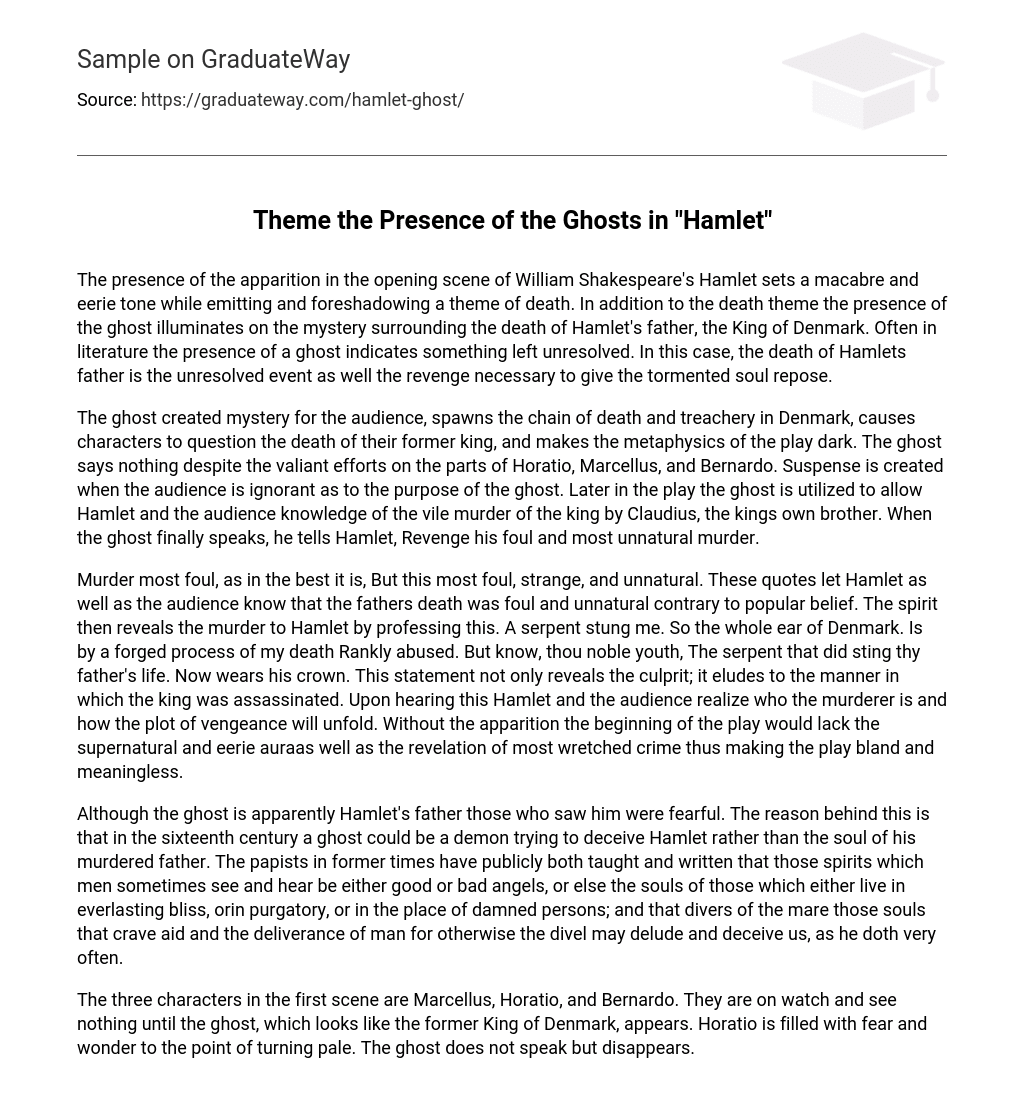The apparition in the opening scene of William Shakespeare’s Hamlet establishes a creepy and unsettling atmosphere, signaling a theme of death. Along with the death theme, the presence of the ghost sheds light on the mysterious circumstances surrounding the death of Hamlet’s father, the King of Denmark. In literature, the appearance of a ghost often signifies an unresolved matter. In this instance, the death of Hamlet’s father remains unresolved, and so does the need for revenge to provide peace to the tormented spirit.
The ghost brings mystery, death, treachery, and metaphysical darkness to Denmark. It prompts characters to question the death of their former king but remains silent despite the efforts of Horatio, Marcellus, and Bernardo. The purpose of the ghost is initially unknown, creating suspense for the audience. Eventually, the ghost reveals the heinous murder of the king by his own brother Claudius to Hamlet and the audience. Finally speaking, the ghost instructs Hamlet to seek revenge for the foul and unnatural murder.
The quotes indicate that Hamlet and the audience are aware that the father’s death was unusual and not what was commonly believed. The spirit then informs Hamlet that it was murdered, using the metaphor “a serpent stung me.” This revelation also implies that the king’s death was a result of a deceitful plan. The statement not only identifies the culprit but also hints at the method of assassination. Upon hearing this, Hamlet and the audience gain insight into the identity of the murderer and anticipate the unfolding of a vengeful plot. Without the apparition, the beginning of the play would lack the supernatural and unsettling atmosphere, as well as the revelation of a heinous crime, resulting in a dull and meaningless performance.
Although the ghost is said to be Hamlet’s father, those who witnessed it were frightened. This was because during the sixteenth century, a ghost could have been a demon attempting to trick Hamlet instead of the spirit of his murdered father. In earlier times, the papists openly taught and wrote that the spirits that people sometimes see and hear are either good or evil angels, or the souls of those who reside in eternal bliss, purgatory, or damnation. They believed that some of these souls seek help and release from humans, as otherwise the devil can frequently mislead and deceive us.
In the first scene, three characters are introduced: Marcellus, Horatio, and Bernardo. They are on watch and initially see nothing until the ghost, which resembles the former King of Denmark, emerges. Horatio is overcome with fear and amazement to the extent of becoming pale. The ghost remains silent and then vanishes. Subsequently, Marcellus and Horatio discuss King Hamlet and Fortinbras of Norway. When the ghost appears again, Horatio utters, “If there be any good thing to be done, That may to thee do ease, and grace to me Speak to me.” In this quote, Horatio is questioning whether there is anything he can do to help the ghost find peace in his current state. However, the former king does not respond.
After this, the cock crows and the ghost disappears, most likely because it cannot be present during daylight. Bernardo, Marcellus, and Horatio try to make the ghost stay by striking it, only to realize that it is futile. Horatio suggests that they should inform young Hamlet about the encounter, as he believes the spirit will speak to him. Horatio asks, “Do you consent that we should tell him? It is necessary for our love and duty.” The three men agree to inform Hamlet the next morning. Shakespeare enhances the somber atmosphere of Denmark by maintaining a serious tone throughout the play, as befits a tragedy. In the opening scene, Francisco remarks, “It is bitterly cold, and I am deeply troubled.”
The bitterness of the coldness serves as an example of the play’s mood, as illustrated in a conversation between Hamlet and Horatio: Hamlet mentions, “The air bites shrewdly; it is very cold,” to which Horatio replies, “It is a nipping and eager air.” This reference to the coldness occurs during the night when the play begins, and it is linked to the mention of the king’s death, which is treacherous, mysterious, and surrounded by murder. The death of various characters, starting with Hamlet, foreshadows the downfall of Denmark. This downfall can be attributed to the weaknesses inherent in Denmark, as even Hamlet himself acknowledges: “Denmark’s a prison. A goodly one, in which there are many confines, wards, and dungeons, Denmark being one o’ th’ worst.”
Hamlet, a nobleman of Denmark, is disgusted with his country at this point in the play. This indicates that Denmark is weakened and heading towards the worst. Claudius, the treacherous and deceiving king, is unfit to lead Denmark as he is evil. Denmark’s lack of temperance in drinking brings mockery from other countries. The Ghost plays a significant role in the plot, adding mystery, wonder, and an eerie atmosphere to the play. It sets the tone for the entire play and transforms Shakespeare’s work into a masterpiece.





